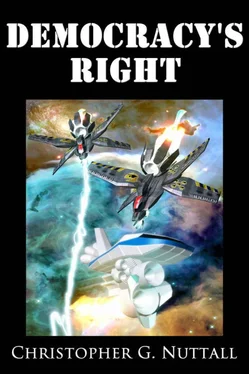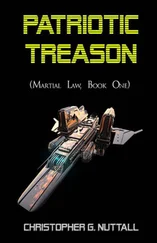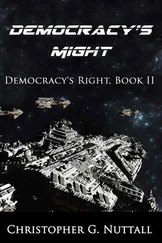And yet, now the message blackout had been broken, the news would be spreading and failing to ask for help would certainly count against him. And, Penny suspected, Brent-Cochrane would send a message of his own to his uncle, if he hadn’t already. Percival had to know that too, which meant that he was trapped. He had to ask for help and hope for the best. She could almost sense his frustration, boiling off him in waves. She hoped, with a burst of malice that was almost worthy of Percival himself, that it choked him.
“I will communicate with Sector 99,” Percival said. She smiled inwardly at his desperation. The message was racing relentlessly towards Earth. Six months — no, less than six months now — and the Thousand Families would know just how badly Percival had bungled the rebellion. A year from now, Percival might receive orders telling him to travel to Earth to be executed, or maybe — if his connections came through — a simple relief from command. “I want you to find the rebels.”
“We will return to our position and wait,” Brent-Cochrane said. “The rebels will eventually fall into our lap.”
“You will go,” Percival said. “Captain Quick will remain with me. I have much to discuss with her.”
Brent-Cochrane kept his opinion on that, if he had an opinion, to himself.
“Yes, sir,” Penny said. Inwardly, she was singing. She could endure any amount of discomfort if it meant she got to watch as Percival received his just deserts. “I’ll remain here.”
“I presume,” Colin said with deadly calm, “that you have some kind of explanation for this?”
The crewman in front of him, a man who would never have set foot in Officer Country at all back when the superdreadnaught had fought for the Empire, looked uncomfortable and nervous. He was standing between two burly Marines, shaking so badly that he could barely stand to attention. Colin studied him carefully, silently noting the unshaven face and rat-like eyes. The crewman didn’t cut a very convincing — or reassuring — image.
But then, no one would have expected the fleet’s commanding officer to deal with the matter personally. Colin had only intervened to make the point that such issues would be taken seriously.
“We noted the problem with the atmosphere scrubbers two weeks ago,” Colin said, when the crewman said nothing. The Marines who had arrested him hadn’t told him why he was under arrest, but Colin suspected that the crewman knew perfectly well why Colin had sent for him — either that or he was guilty of something else. “Crewman First Class Nix… why were they not replaced?”
Nix flushed. It wasn’t traditional to spell out a crewman’s full rank. It was almost inevitably the prelude to a chewing out, if not summary demotion. The lower decks maintained themselves through harsh discipline, overseen by the NCOs, and a shared belief that attracting the attention of the senior officers was a bad idea. Colin hoped that Nix understood how much trouble he was in; if not, Colin would feed him the problem step by step, and then inform the crewman of just how he was going to be punished.
He smiled, inwardly. If nothing else, it was incredibly rare for an Admiral to handle such matters. His mere involvement would be a stern message to the crew.
“My department was busy coping with the reloading of the missile tubes,” Nix said, finally. His shaking hadn’t improved. “We didn’t have time to switch out the atmosphere scrubbers. Sir, My Lord, those scrubbers are good for at least another two months…”
His voice died away as Colin looked at him, feeling a sudden urge to draw his pistol and shoot Nix though the head. On the face of it, Nix was quite right; the superdreadnaught — indeed, all military starships — was over-engineered and could have lost half of the scrubbers without the crew finding it hard to breathe. But then, Nix’s real offence hadn’t been anything to do with not replacing a scrubber. His offence was far worse.
“You may be right,” Colin said. Nix sagged against one of the Marines. Only a complete idiot would have mistaken Colin’s tone for forgiveness. “You may have been able to leave the scrubbers in place without causing an immediate problem. Now tell me… what else did you do?”
Nix flushed. “I did nothing else, My Lord,” he protested. “It was the only shortcut…”
“I read your 666, Nix,” Colin said, sharply. “Would you like to know, I wonder, just what it said?”
The Imperial Navy loved paperwork — indeed, Colin had sometimes thought that the fleet could probably have used its piles of paperwork to bombard anyone intending to attack the Empire. Everything had to be logged; the loss of even a single bullet had to be noted and, eventually, would provoke an inquiry from the bureaucracy. Everyone on a warship had their own set of paperwork to fill out, most of which Colin had gleefully abandoned once the rebellion had started, yet there were some pieces of paperwork that could not be rejected or converted into toilet paper.
A copy of Form 666 had, according to regulation, to be filled out to account for each and every replaced part on the starship. A supervising crewman — like Nix — was responsible for filling in the forms for his department, adding them to the database in the ship’s computers and allowing his commanding officer to learn, with the touch of a button, the exact condition of his ship. Or maybe not; it was far from unknown for junior officers or crewmen to fill out fake 666 forms, knowing that the risk of detection was minimal. How many Captains would crawl through the tubes connecting one part of the ship to another, knowing that it would smudge their fancy uniforms? Colin had even heard rumours that entire superdreadnaught squadrons had been allowed to rust, while their commanders filled out fake forms verifying that they existed and pocketing the pay for the crew.
“I read your 666 very carefully,” Colin said, when Nix declined to reply. “It told me that the atmosphere scrubbers in your section had been replaced on time, right when you were helping to manhandle missiles through the tubes and out into space. And then it told me that you and your crews replaced the scrubbers all the way back to the day we took these ships off Commodore Roosevelt. And yet, when I had the scrubber examined, it had clearly been in place longer than six months. No wonder those poor recruits complained about the smell!”
His nostrils twitched as he contemplated the issue. The scrubber had been installed in a tube connecting two compartments, one used to house crewmen and the other used to house recruits from the various asteroid colonies out past the Rim. The crewmen had ignored it — they were used to having their interests and concerns dismissed by their superiors — but the recruits, all hailing from various asteroid colonies, had taken their concerns to the NCOs, who in turn had taken them to the engineers. The scrubber had been located and, when the engineers had seen it, they’d called Colin and handed the issue over to him.
There were times when a scrubber would break, even without being in place for far longer than regulations permitted. Even the finest ships in the Imperial Navy ended up with infestations of mice, rats or even cockroaches, who left their dead bodies on the scrubbers with alarming regularity. Colin wouldn’t have been angry at Nix if a scrubber had failed in such a way, but Nix had done something incredibly stupid and dangerous. He had also done something that, in the Imperial Navy, could carry a death sentence.
“And then I checked the numbers,” Colin said, watching Nix wilt under his gaze. “The number on your 666 documents didn’t match the serial number on the scrubber. I checked with the database and the number on the scrubber, it seems, was assigned to one that should have been withdrawn over two years ago. And, needless to say, you didn’t even have that number on your 666 forms at all!”
Читать дальше












